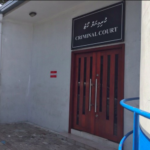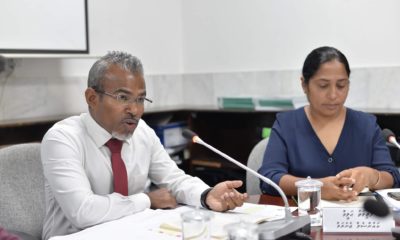Three Maldivian men arrested from the Turkey-Syria border in February pleaded not guilty Tuesday to terrorism charges.
Ahmed Latheef, Ahmed Suhail Moosa, and Munawwar Abdulla are the first to stand trial for travelling abroad with the intent of joining a terror group after the offence was criminalised by the controversial 2015 Anti-Terrorism Act.
After filing the not guilty plea, defence lawyer Ismail Mohamed told the court that his clients had travelled to Turkey for a business trip and challenged the basis for the terrorism charge.
“The charges against my clients accuse them of travelling abroad, to ‘participate’ in a ‘civil’ war in a foreign country. To prove these charges, the state needs to specify how travelling to Syria is a crime,” he said.
He also argued that the prosecution needs to show why the state considers Syria to be in the midst of a civil war.
“Syria is a country that obeys international law, a member of the United Nations. There hasn’t been a law, a regulation or even a press release by the Maldivian state that says travelling to Syria is a crime,” he said.
“The prosecution also needs to explain what ‘participating’ means, how my clients are being accused of travelling to ‘participate’ in the war. Travelling to do what, and on whose instruction count as traveling to ‘participate’?”
The ruling party-dominated parliament had amended the anti-terror law in March to keep a list of designated terror groups secret. The law previously required the president to make the list public.
It is now known only to the national security council and the Maldives National Defence Force.
Ismail also said that he has not received any case documents from the prosecution that could prove his clients had tried to cross the border from Turkey.
Most of the documents handed over so far were anonymised, he noted, asking the prosecution to make them available in full in order to prepare for and mount a defence.
He also asked the prosecutors if the police had obtained a court warrant to access the phone conversations of the three.
When the prosecutor answered yes, the judge asked him to make the warrant available to the defence.
The court is due to hear prosecution witnesses at the next trial date, which was not announced yesterday.
According to Raajje TV, the three men were arrested while trying to cross a mud ditch dug between border fences as a buffer to prevent illegal crossings.
The group comprised of five Maldivians and only one managed to cross the border. A fourth man, identified as Anas, remains incarcerated in Turkey, Raajje TV said.
The rest were extradited to the Maldives in March by the Turkish authorities.
Days after the state raised charges against the three in May, a popular teacher was arrested on a southern island on suspicion of links to terrorist organisations.
The current administration had been accused of ignoring the threat posed by jihadi recruitment since the first reports of Maldivians joining militant groups emerged two years ago.
The opposition claims as many as 250 Maldivians are fighting in Syria and Iraq – the highest per capita in the region.
But the government says the opposition has been inflating the figure to lobby international support for its cause, decrying damage to the economy due to “exaggerated” claims and offering various lower estimates.
At least six Maldivians fighting with the Al-Nusra Front are believed to have been killed in battle.
Earlier this month, the parliament approved the first state policy on combating terrorism and violent extremism, which broadly outlined plans to take “a central and active role” internationally, strengthen national security, and conduct de-radicalisation and rehabilitation programmes.



















